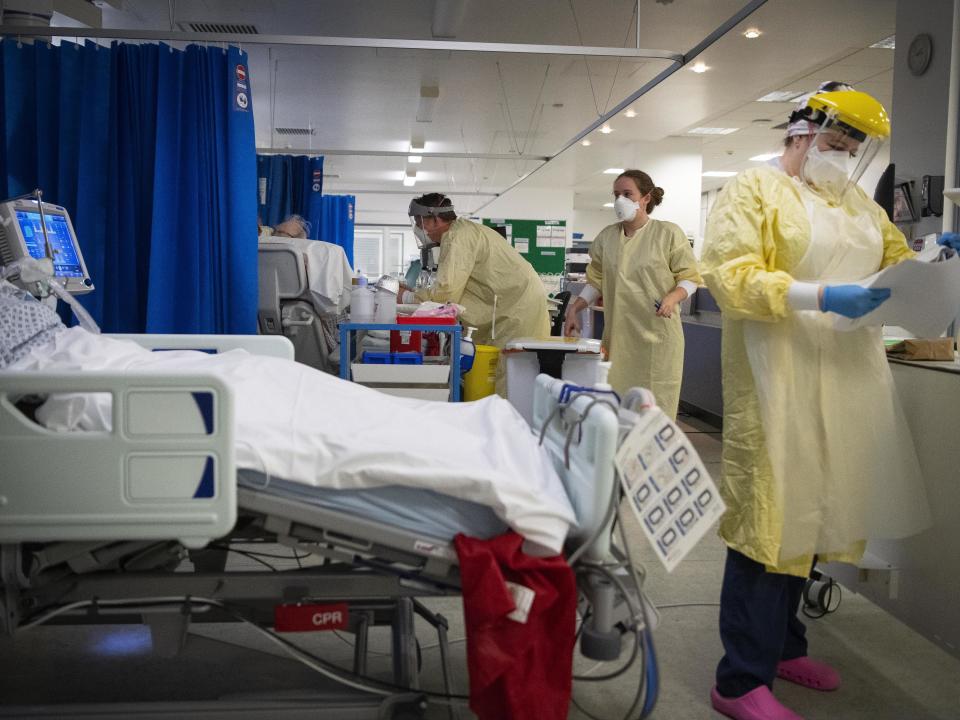There was nothing inevitable about reaching 100,000 Covid deaths – the government cannot evade responsibility

Nurses treat patients in the ICU (Intensive Care Unit) at St George’s Hospital in Tooting, southwest London
(PA)The 100,000 Covid deaths marker has arrived with a grim relentlessness as the nation becomes inured to the daily toll. In truth it was reached some time ago as the official figures significantly under-represent those lost to coronavirus and to its wider fallout.
The official figures for those dying within 28 days of a positive test do not include those who succumb after prolonged admissions to intensive care nor the increasing numbers who die after re-admission as a result of serious complications.
Covid-19 can have a devastating impact on the heart, lungs, kidneys and other organs. The disease is also indirectly shortening or blighting the lives of people without the virus but who find themselves unable to access vital investigations and treatment.
Hospitals overwhelmed with coronavirus have had to divert staff from other duties and that is reflected in unprecedented waiting times, even hitting many of those waiting for urgent cancer investigations and appointments. Ambulances backed up for hours outside emergency departments and patients in corridors translate into higher mortality and avoidable complications, whatever the reason for admission.
When this deadly dust settles, it will be the number of fatalities over and above the five-year average that provides the most accurate picture of how different nations handled, or mishandled, the pandemic.
There was nothing inevitable about the UK having among the very highest death rates in the world. Our government, led by Boris Johnson, should not be allowed to evade responsibility by attributing this to the new variant; its dire performance was “world beating” in the worst sense even before that emerged.
As an island nation, we were uniquely placed to take control and to capitalise on lessons from the first wave. But instead of taking advantage of the relatively low base of infections in the summer the government ushered in waves of new cases and further seeded outbreaks around the country with their gravely mishandled return of students to universities.
This added to the long list of failures on PPE, test and trace, the wearing of masks, dither and delay on lockdowns and superspreader events. Even the prime minister boasting of shaking hands in hospitals when others had long recognised the dangers.
The government has degraded or dispensed with so many of the mechanisms that would normally be there to hold it to account, instead sending out ministers to falsely talk up the prime minister’s dismal leadership. The lack of accountability matters because there has been little sign of government learning from its mistakes.
The only positive has been the vaccination programme, and its success owes much to finally being an area not farmed out to the private sector. Here at least the government has listened to the expert advice of the Joint Committee on Vaccination and Immunisation (JCVI).
Across the country, clinicians and volunteers are now rolling up their sleeves and getting on with the job. I’m proud to be joining them and to witness the enthusiasm, hope and relief of those receiving their first shots. The decision to delay the second dose has been controversial but it was a pragmatic response to a shortfall in supply.
While that shortage continues, for every second dose administered to give some additional protection, there is another person left with none. Those second doses will be given but I believe it was right to give some protection to as many of the most vulnerable as possible, as quickly as possible, in this first phase.
It is now time to look ahead to the next stage of the rollout and, as the JCVI keep their prioritisation under review, I hope its members will also consider the impact of Covid-19 on health inequality. The pandemic will not only further widen the gulf in life expectancy between rich and poor, but also the years lived in good health. It is far easier for the wealthy to protect themselves from catching the disease and they do not face the same economic fallout from having to self isolate if exposed.
If, as hoped, vaccination starts to reduce the overall death toll and burden on overstretched NHS services, there is a compelling case for focusing too on the inexcusable and widening health inequality across the country.
Dr Sarah Wollaston is a former Liberal Democrat MP for Totnes and a former health and social care select committee chair. Dr Wollaston is now back in clinical practice
Read More
100,000 deaths – the names alone would take as long to read as a novel
How the UK lost 100,000 lives to Covid-19
‘Hard to compute the sorrow’ of 100k Covid deaths, Boris Johnson says
UK Covid deaths surpass Great Plague, Aids and every war since 1945
Studies extend hopes for antibody drugs against COVID-19
Why can’t Boris Johnson stop overpromising and underdelivering?

 Yahoo Finance
Yahoo Finance 